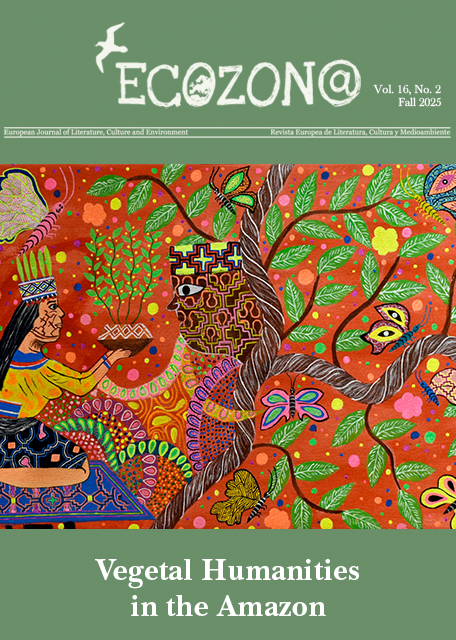Gardening the Symbiocene: Andrea Zanzotto’s and Daria Menicanti’s Poetic Hospitability
DOI:
https://doi.org/10.37536/ECOZONA.2023.14.1.4828Schlagworte:
poetry, Zanzotto, Menicanti, vegetal, SymbioceneAbstract
This essay explores the weaving together of vegetal and elemental narratives through the poetry of Andrea Zanzotto and Daria Menicanti and shows how their experience of the landscape is punctuated by cross-species encounters, a radical openness to the world, the belief in the common roots of all life, and the embrace of vulnerability in interactions with others. Starting from the premise that these poets comprehend that an emphasis on verbality reflects the anthropic desire to translate life into a one-species code and constitutes an impediment to universal and meaningful communication, this essay argues that Zanzotto’s and Menicanti’s embrace of the nonverbality of plant communication becomes key in the process of meaning-making. A narration of and with plants is the antidote to what they understand as the ultimate malady of language that prevents it from grasping and conveying the richness of the world after it has supplanted the nonhuman domain. Through a close reading of four poems that illustrates how the poets embrace the eloquent silences, gaps, hesitations, and overabundance of meaning of the vegetal realm, this essay foregrounds the boundary-breaking quality of Zanzotto’s and Menicanti’s poetry as a space for rich human-nonhuman exchanges. Ultimately, this essay argues that by declining to place themselves above plants and exert power over them, Zanzotto and Menicanti usher in the Symbiocene, the era characterized by multispecies coexistence, mutual support, and interdependence. Their poetry creates spaces where the human can lean into the more-than-human and, for one brief instant, get a taste of existing in harmony with the life that pulsates all around.
Downloads
Downloads
Veröffentlicht
Ausgabe
Rubrik
Lizenz
Authors who publish with this journal agree to the following terms:
a) Authors retain copyright and grant the journal right of first publication with the work simultaneously licensed under a Creative Commons Attribution License that allows others to share the work with an acknowledgement of the work's authorship and initial publication in this journal (CC BY-NC for articles and CC BY-NC-ND for creative work, unless author requests otherwise.
b) Authors are able to enter into separate, additional contractual arrangements for the non-exclusive distribution of the journal's published version of the work (e.g., post it to an institutional repository or publish it in a book), with an acknowledgement of its initial publication in this journal.
c) Authors are permitted and encouraged to post their work online (e.g., in institutional repositories or on their website) prior to and during the submission process, as it can lead to productive exchanges, as well as earlier and greater citation of published work (See The Effect of Open Access).










